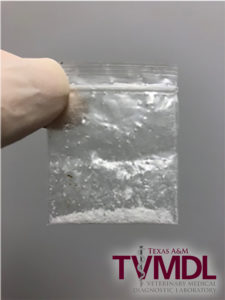A six-month-old, intact male, Doberman Pinscher was observed chewing on a small zip-lock bag and then spit it out. The dog became hyperactive and difficult to control. The dog also developed a bloody, mucoid stool. No vomiting was noted. The small zip-lock bag was submitted to the Texas A&M Veterinary Medical Diagnostic Laboratory (TVMDL) for testing in the agency’s Analytical Chemistry Section. The bag contained small granules of a white crystalline material. A general drug screen was performed to try and identify the material.
Approximately 2 mg of the material was dissolved in methanol and then three aliquots were taken and dried under nitrogen. One dried aliquot was reconstituted in liquid mobile phase and screened using liquid chromatography – high resolution accurate mass spectrometry (LC-HRAMS). Two additional dried aliquots were prepared, one derivatized and one non-derivatized, for screening using gas chromatography – mass spectrometry (GC-MS).
The material produced an overwhelming signal for methamphetamine during the screening process using LC-HRAMS. As a result, screening using GC-MS was not performed. The extract was then re-analyzed using liquid chromatography – tandem mass spectrometry (LC-MS/MS) and methamphetamine was confirmed.
Methamphetamine is a potent central nervous system stimulant. Because of its increasing illicit availability, accidental or intentional exposure to methamphetamine in dogs is becoming a more likely scenario. The diagnosis of methamphetamine toxicosis should be based primarily on the recognition of the clinical signs of extreme agitation, seizures, tremors, persistent tachycardia, hypertension, hyperthermia, and other sympathomimetic effects. Other drugs such as cocaine, ephedrine, pseudoephedrine, methylxanthines, or strychnine can cause similar central nervous system stimulation and must be included in a differential diagnosis list for methamphetamine toxicosis.
For more information about TVMDL’s test offerings, visit tvmdl.tamu.edu or call 1.888.646.5623.

REFERENCES
Zengyang P and Zhang X. Methamphetamine intoxication in a dog: case report. BMC Veterinary Research. 2014, 10:139.